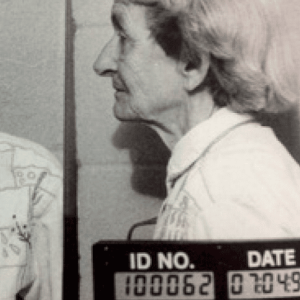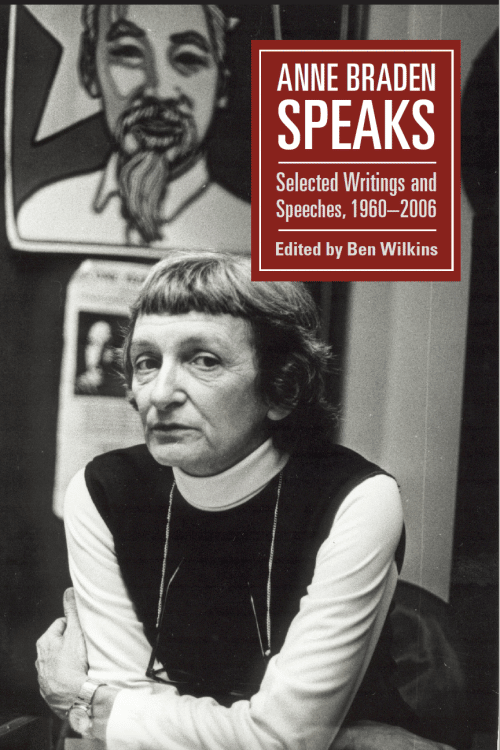Watch below a fascinating conversation spurred by the new book, Anne Braden Speaks, featuring Robin D.G. Kelley, Roz Pelles, and editor Ben Wilkins.
The three discussed the transformative potentials represented by the notion of the “Beloved Community,” the brutal consequences of anti-Communism (such as the Greensboro Massacre), the role of white people in the fight against white supremacy (and specifically the importance of organizing with poor whites), the notion of “The Other America,” and the evolution of Braden’s worldview over her many decades as an organizer.
EXCERPTS
From the Introduction, by Ben Wilkins
“I never saw myself as a leader of a movement and I still don’t,” (Braden) said in a 1999 interview with the Louisville Courier-Journal. “I see myself as a soldier in the trenches.” Like that of many of her co-conspirators of the 1960s, Anne Braden’s legacy was celebrated and sanitized to fit within the official version of civil rights history.
….She argued that white supremacy, historically rooted in the remnants of the Southern slave labor system, was core to every aspect of American society: its material, economic relations; its systems of class political domination; and all its ideological, cultural, and psychological contradictions. In the United States and particularly in the South, white supremacy was the cement that held the entire exploitative structure of society in place. Therefore, Braden argued, the fight against racism, especially in the South, was essential to any serious effort to make broad social change in the country….
From “Letter from Anne Braden to the Reverend Dr. Martin Luther King Junior“
My feeling is that there are really two separate and distinct kinds of fears of communism:
One is the fear of the philosophy of communism. This is the kind of fear often felt by people who are sincerely concerned that communism might take over a movement and pervert it to evil ends—or at least to evil means.
…I think you have a deep-rooted confidence in the basic strength of your own beliefs; therefore you do not have to be fearful of pitting them against any other beliefs in the world….This is the kind of confidence I think everyone should have. If they don’t have it, they are in my opinion someway unsure of their own beliefs. For one thing, it seems fantastic to me for anyone to think that any small group of people, such as a group of communists, could ever manipulate anything as big as the current integration movement….
The second kind of fear of communism which many people have really has nothing to do with a basic fear of the philosophy itself. It is the thing we talked about last Sunday—the fear of labelling process, the feeling that many people have that since they are up against terrific problems anyway they must avoid this label if they can possibly do so. This is what tends to make us all afraid of each other, afraid of anyone who has the label, the fear of guilt by association….
It seems to me this is all pretty self-defeating….
From “The Southern Freedom Movement in Perspective” (a letter in reply to Monthly Review, 1965)
In January of this year, one of the editors of Monthly Review asked me what was happening in the Southern freedom movement. What, he asked, had it accomplished, what were its long-range objectives, where did it appear to be going?
This article is an attempt to deal with these questions.
It is not really an attempt to answer them….
No one could attempt such an analysis as this without serious misgivings. The Southern movement is big and diffuse and far-flung. No one person could possibly know about it all. Interpretation of history must always reflect the vantage point from which it is viewed, and some will disagree with mine. The fact that I am white instantly raises questions as to whether my views can have basic validity in regard to this particular movement. The fact that I am still living and breathing and taking part in the struggle instantly presents the possibility that I may change my opinions on almost any question within the next few years, or even the next few months….
What people are saying about Anne Braden Speaks:
―Michael K. Honey, author of To the Promised Land: Martin Luther King and the Fight for Economic Justice, and a former southern organizer with Carl and Anne Braden.
–William J. Barber, II, President of Repairers of the Breach and co-chair of the Poor People’s Campaign: A National Call for Moral Revival
―Catherine Fosl, Professor of Women’s, Gender, & Sexuality Studies, University of Louisville and author, Subversive Southerner: Anne Braden and the Struggle for Racial Justice in the Cold War South
–Rosalyn Pelles, civil rights activist, former Executive Director of the National Rainbow Coalition and former Director of the Civil, Human and Women’s Rights Department, AFL-CIO
—Donna Willmott, facilitator for the Catalyst Project’s Anne Braden Anti-Racist Organizer Training Program
―Carla F Wallace, Co Founder, Showing Up for Racial Justice


Comments are closed.